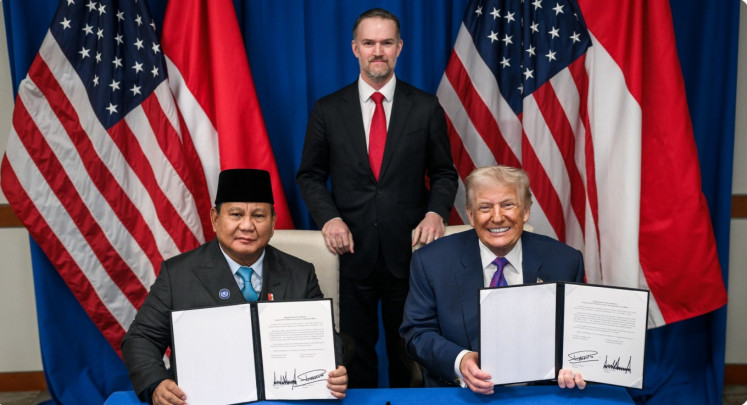Popular Reads
Top Results
Can't find what you're looking for?
View all search resultsPopular Reads
Top Results
Can't find what you're looking for?
View all search resultsOff-grid green energy: Revolution to evolution
More than 2,000 villages will still not be electrified by 2019. This poses both a challenge and an opportunity.
Change text size
Gift Premium Articles
to Anyone
I
ndonesia has reached a nearly 97 percent ratio of villages with electricity, in which over 2,500 villages had no electricity in 2014. The plan of state-owned electric company PLN to build more power plants is merely to cover 504 villages up to 2019 (Central Statistics Agency [BPS], 2015), which implies that more than 2,000 villages will still not be electrified by 2019. This poses both a challenge and an opportunity.
Then comes off-grid renewable energy (RE) development. It is where developers create new supplies and micro-grid solutions that are disconnected from PLN’s grid. Based on the recent statistics published by the International Renewable Energy Agency (IRENA) titled “Rethinking Energy 2017,” the RE electricity generation in Indonesia in 2014 was 33,750 gigawatts per hour (GWh).
This is diminutive compared to China’s RE generation of 1,253,230 GWh, India with 185,569 GWh, and nearly half of Vietnam’s generation of 66,489 GWh.
Ministerial Decree No. 38/2016 was devised to help expedite electricity development in the remote villages across the nation. Shortly after, Ministerial Regulation No. 12/2017 on new and renewable energy was introduced, which put price caps on RE rates.
As such, the capping of RE rates may challenge profitability and sustainability of RE providers. Some have argued that incentives should not be offered and further suggested that Indonesia should also be able to reduce the high prices in the sector to encourage further development, especially in remote regions (The Jakarta Post, Jan. 25).
However, despite this sentiment, the reality is that the Indonesian archipelago includes many remote regions that are not easily accessed. The challenges of rural off-grid RE are, among others, due to the high cost of equipment and personnel mobilization to remote sites, high costs for operation and maintenance personnel costs and battery replacement (particularly for solar photovoltaic). Viable business plans are required to ensure the sustainability of off-grid community renewable energy.
There have been many prior community-based projects that have failed owing to insufficient funds to operate and maintain the infrastructure. The communities must be preconditioned to have ownership of the power plant, through shares or other types of contributions. Despite the “warm glow” of community RE projects, business is business and must be profitable; especially so if the private sector is involved.

















